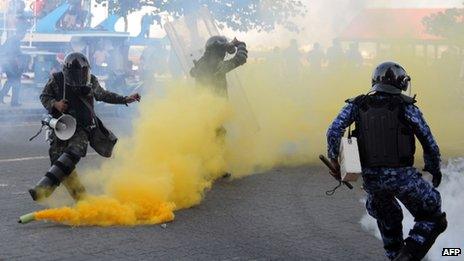Q&A: Maldives crisis
- Published

There have been protests in the Maldives after the country's first democratically-elected president was forced to step down amid unrest. Supporters of former president Mohamed Nasheed have described it as a "coup" backed by his predecessor, Maumoon Abdul Gayoom, a charge the authorities deny. The BBC looks at what the crisis means for the Indian Ocean archipelago.
What led to Mr Nasheed's departure?
Mr Nasheed quit on 7 February, after security officials joined opposition-led protests over the arrest of a senior judge. Mr Nasheed said he was stepping down to prevent "bloodshed", but has since said he was forced to do so under duress.
Demonstrations had been held regularly since the military detention of Judge Abdulla Mohamed, the chief judge of the criminal court, on 16 January. He was detained - at the request of Mr Nasheed - after ordering the release of an opposition politician, Mohamed Jameel Ahmed.
Mr Jameel, who served in the cabinet of former President Gayoom, was arrested several times after issuing detailed pamphlets accusing Mr Nasheed of undermining Islam by conspiring with Christians and Jews.
Mr Nasheed's aides said Judge Mohamed was intervening not only in Mr Jameel's case, but blocking human rights and corruption cases against all opposition figures. Critics, however, say Mr Jameel's arrest should not have occurred in the first place and accuse the former president of over-reaching his powers.
Some observers say Mr Nasheed was frustrated after the civil court banned the Judicial Services Commission from investigating several alleged cases of misconduct against the judge, effectively making him invulnerable.
Was former president Maumoon Abdul Gayoom behind it?
Several organisations, including the Supreme Court, called for the release of Judge Mohamed, calling his detention unconstitutional.
But while the episode is seen as the catalyst for Mr Nasheed's departure, most believe other forces were at play.
Mr Nasheed and his party allege that the new president, Mohammed Waheed Hassan Manik, was part of a conspiracy with opposition parties - linked to former President Gayoom - to oust him. Mr Gayoom - who ruled for 30 years - handed over the reins in 2008, when he was challenged at the polls.
Mr Nasheed's supporters claim the agreement was made at a recent meeting the vice-president held with opposition figures, external. But Mr Waheed, whose leads a small party of his own, has denied the allegations. After his swift elevation to president, he said he intended to create a national unity government, and restore law and order to the country of 400,000 people.
He wished to include Mr Nasheed's party in his national unity government, he said, but that the offer had been rejected.
However, Mr Waheed's appointment on 8 February of two ministers, external linked to Mr Gayoom raised eyebrows.
One, notably, was Mr Jameel, the man released by Judge Mohamed and at the centre of the crisis, who was brought in as home minister. The second, the new defence minister, is retired colonel Mohamed Nazim, who has also come up against Mr Nasheed, who sacked him in 2009.
Later appointments brought in other figures associated with Mr Gayoom.
Will Mr Nasheed or Mr Gayoom stage a comeback?
Thousands of Mr Nasheed's supporters took part in protests on 8 February in Male to demand his reinstatement. The police reacted with force, and there is video footage of groups of officers beating people on the streets. Senior members of the former ruling party were injured in the clashes, at least one seriously.
After more than a week of tension, an Indian-brokered agreement led to President Waheed agreeing to holding polls earlier than scheduled - although only, he says, if conditions are "right". The current elections are due to take place at the end of 2013.
Mr Nasheed has been demanding snap elections, but Mr Waheed rejected the idea. Meanwhile, the former president says he will still continue demonstrations.
An arrest warrant has been issued for Mr Nasheed, although the authorities have yet to enforce it.
Mr Gayoom, who formed the Progressive Party of Maldives (PPM) last year, has denied any involvement in the alleged coup, although he has congratulated Mr Waheed on his new post. Asked this week if he would run in the next polls, he told local media he was keeping his options open.
What effect might the crisis have on the tourism industry?
The Maldives is made up of about 2,000 islands, of which fewer than 200 are inhabited. Tourists usually arrive at the airport and are quickly whisked away by boat or seaplane to resorts on atolls, tending only to visit Male on day trips.
As such, they are not likely to be affected by the unrest, which has mainly taken place in the capital.
While demonstrations have spread to outer atolls, there have been no protests so far reported on resorts or Male airport island.
In spite of this, the international headlines are likely to have some impact on tourism, the Maldives' largest industry.
Certain countries, including the UK, have cautioned tourists about travel. There have also been reports of holiday cancellations.
But on 16 February, President Waheed urged visitors to come to the country, assuring them that the situation had settled.
Any impact on tourism - which accounts for a third of GDP - would further strain the already indebted nation.
- Published9 February 2012
- Published8 February 2012